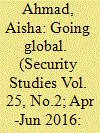|
|
|
Sort Order |
|
|
|
Items / Page
|
|
|
|
|
|
|
| Srl | Item |
| 1 |
ID:
148449


|
|
|
|
|
| Summary/Abstract |
This article argues that, contrary to the assumptions of international relations scholars, policymakers, and the general public, states do not engage in oil wars. A twofold strategy is employed to support this assertion. First, the article scrutinizes the logical underpinnings of oil war claims, arguing that proponents have underestimated the obstacles to seizing and exploiting foreign resources and, consequently, exaggerated the likelihood of oil wars. Second, the article examines four conflicts that are commonly identified as international oil wars: Japan's attack on the Dutch East Indies in World War II, Iraq's invasion of Kuwait, the Iran--Iraq War, and the Chaco War between Bolivia and Paraguay. It finds that the desire to control additional oil resources was not the fundamental cause of aggression in any of these conflicts. In the latter two cases, aggression was unconnected to oil interests. In the former, states fought for their survival, not for an oil prize.
|
|
|
|
|
|
|
|
|
|
|
|
|
|
|
|
| 2 |
ID:
148452


|
|
|
|
|
| Summary/Abstract |
The global landscape of modern jihad is highly diverse and wrought with conflict between rival Islamist factions. Within this inter-Islamist competition, some factions prove to be more robust and durable than others. This research proposes that the adoption of a global identity allows an Islamist group to better recruit and expand their domestic political power across ethnic and tribal divisions without being constrained by local politics. Islamists that rely on an ethnic or tribal identity are more prone to group fragmentation, whereas global Islamists are better able to retain group cohesion by purging their ranks of dissenters. To examine these two processes, I present original field research and primary source analysis to examine Islamist in-fighting in Somalia from 2006–2014 and then expand my analysis to Iraq and Syria, Pakistan, and Mali.
|
|
|
|
|
|
|
|
|
|
|
|
|
|
|
|
| 3 |
ID:
148451


|
|
|
|
|
| Summary/Abstract |
Some argue a powerful China will likely reestablish a Sinocentric tribute system in pursuit of hegemony in Asia. This line of argument, however, rests on misleading images of the Chinese empire while assuming hegemony is a product of a single agent and its activities. But, why do actors comply with, defy, or challenge hegemonic authority? I argue hegemony is not just an outcome of the material power of the preponderant state, but is constructed in interaction with other actors’ pursuit of domestic legitimation. The tribute system and Chinese hegemony in early modern East Asia were built on symbolic domination—Chinese views of how international politics should work determined what was socially acceptable and legitimate while regulating the range of choices other actors could make due to domestic consequences. It shows that crafty political leaders engaged in a form of symbolic politics that manipulated external recognition from the hegemon, but in ways that strengthened their positions against domestic opponents.
|
|
|
|
|
|
|
|
|
|
|
|
|
|
|
|
| 4 |
ID:
148448


|
|
|
|
|
| Summary/Abstract |
Over the past century peak oil forecasts have had a profound influence on US foreign policy. Unquestioned acceptance of these forecasts, all of which proved wrong, repeatedly led policymakers to assume that rival powers sought to seize dwindling supplies or that disaffected exporter states would decline to sell. Perennial expectation of impending scarcity elevated the perceived importance of foreign oil, especially from the Middle East (ME). In response, increasingly aggressive US policies were adopted to secure ME oil. I call belief in an oil scarcity imperative for aggressive policy oil scarcity ideology. Policymakers’ concerns over oil's availability were repeatedly challenged by market information, which was always ignored. Recurring pessimism over future supply during times of high price was always followed by oversupply and low price, yet aggressive polices to secure supply were never reassessed after scarcity failed to materialize. Scarcity ideology's exemption from scrutiny drove a policy ratchet: US–ME policy could become more aggressive, but not less.
|
|
|
|
|
|
|
|
|
|
|
|
|
|
|
|
| 5 |
ID:
148447


|
|
|
|
|
| Summary/Abstract |
Why do great powers fear oil coercion, and what explains the strategies they adopt to protect themselves from it? The paper identifies three types of anticipatory strategies great powers pursue: self-sufficiency, indirect control, and direct control. A state's choice of strategy depends on its degree of vulnerability to oil coercion, which in turn is determined by two independent variables: the amount of oil the country possesses compared to what it needs to meet strategic objectives and the susceptibility of its imports to physical disruption. Great powers fear oil coercion not only because they worry about damage to their economies; petroleum denial also threatens a country's military capabilities. Four case studies illustrate the theory, including Great Britain's efforts to reduce coercive vulnerability at the close of the First World War and Adolf Hitler's attempts across three periods to safeguard German oil access before and during World War II.
|
|
|
|
|
|
|
|
|
|
|
|
|
|
|
|
| 6 |
ID:
148450


|
|
|
|
|
| Summary/Abstract |
Many scholars are drawn to political science research with hopes that their ideas will influence important policy debates. Unfortunately, scholars who want to shape policy often do not design research appropriately or take advantage of available conditions and opportunities to advance their ideas. This article identifies the conditions under which ideas of academics—and nongovernment knowledge in general—are more likely to be considered by and influence those in the policy world. To reach beyond the ivory tower, we argue that scholars should design research that might produce actionable findings and recommendations, identify moments of ripeness in policy debates, and inject their ideas into the policy process. For those who want to conduct rigorous academic scholarship and influence real-world debates, we provide the strongest possible encouragement and hope that our advice proves helpful.
|
|
|
|
|
|
|
|
|
|
|
|
|
|
|
|
|
|
|
|
|